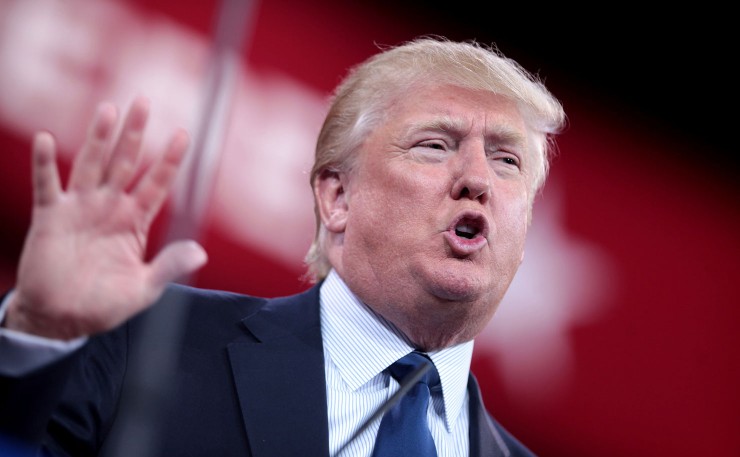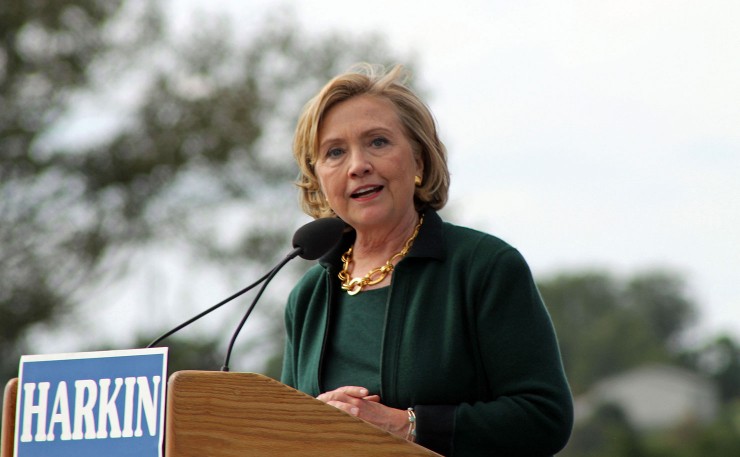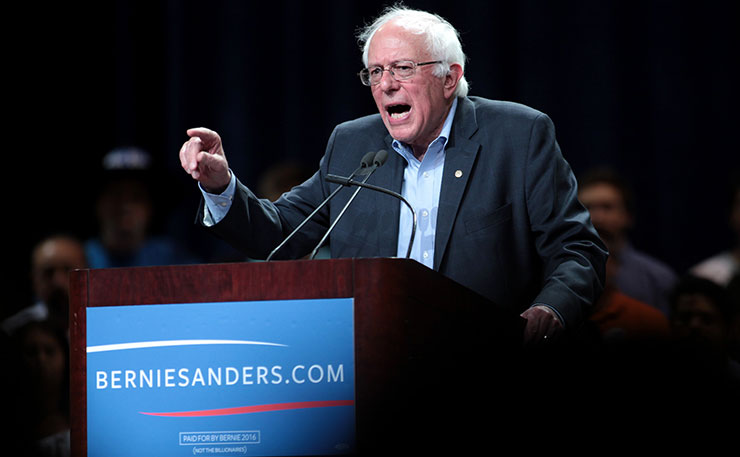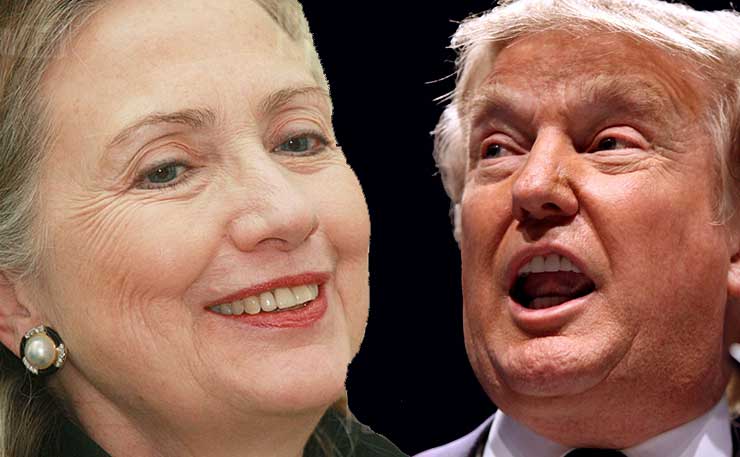While many Americans fear the extremes of a Donald Trump Presidency, Hillary Clinton’s 2016 campaign slogan offers little hope: “Corporate Totalitarianism We Can Believe In”, writes Liam McLoughlin.
“By means of ever more effective methods of mind-manipulation, the democracies will change their nature; the quaint old forms — elections, parliaments, Supreme Courts and all the rest — will remain. The underlying substance will be a new kind of non-violent totalitarianism. All the traditional names, all the hallowed slogans will remain exactly what they were in the good old days. Democracy and freedom will be the theme of every broadcast and editorial…Meanwhile the ruling oligarchy and its highly trained elite of soldiers, policemen, thought-manufacturers and mind-manipulators will quietly run the show as they see fit.”
– Aldous Huxley, Brave New World Revisited, 1958
There are times in contemporary political debate when comparisons to totalitarian regimes are lazy, reactionary, thoughtless, facile and just plain offensive. Describing your political opponent as the “Dr Goebbels of economic policy” might be such an example.
There are other times when such comparisons are judicious, accurate and instructive. To ignore these parallels is not only wilfully ahistorical, but also potentially dangerous.
Glenn Greenwald made a similar argument in a 2010 Salon piece called The Odiousness of the Distorted Godwin’s Law. Although Godwin’s Law originally referred to the increased likelihood of Nazi references the longer a discussion goes on, the distorted version denounces all references to German crimes.
Greenwald argues there are many cases in which such comparisons “illuminate important truths” and describes this blanket dismissal as “arbitrary and anti-intellectual in the extreme”.
In the age of Trump, many fear the repetitive doom of unlearned history.
Refusing to submit to the derisive howls of the Godwin’s Law Gestapo (soz), much recent analysis has tackled the totalitarian tendencies of Donald Trump.
Professor of Public Policy, Robert Reich has made specific comparisons with early 20th century fascism, including Trump’s use of fear and minority scapegoating, his posturing as a muscular patriotic hero who can fix the economy and inflate national power, and his exploitation of the cult of personality.

Others highlight his contemptuous attitudes towards the rule of law and press freedom. An article back in May called Why the 2016 Election Cycle Could be the Start of a Totalitarian Strain in US Politics identified Trump’s call for a ban on Muslim immigration as a likely violation of the Constitution along with his support for waterboarding as a potential contravention of the United Nations Convention against Torture.
Meanwhile the Committee to Protect Journalists (CPJ), an American NGO based in New York, says a Trump presidency would present an “unprecedented threat to the rights of journalists and to CPJ’s ability to advocate for press freedom around the world”.
Such fears have been voiced in America’s most respected publications. The New Yorker published a piece earlier this year suggesting, “If Trump came to power, there is a decent chance the American experiment would be over” and one in July arguing that to call Trump a fascist is “simply to use a historical label which fits”. New York Times book reviewers are even drawing pretty clear Hitler analogies.
More recently, in the wake of the second Presidential debate, The Nation ran the headline Donald Trump Just Summed Up His Totalitarian Vision For America in 4 Words; those words being his threat to Hillary Clinton that “you’d be in jail” if he was in charge.
Yet Trump is not the only totalitarian threat in Election 2016.
In his 2008 book Democracy Incorporated, American political philosopher Sheldon Wolin argued the American system of government was devolving from democracy to “inverted totalitarianism”:
“In coining the term “inverted totalitarianism” I tried to find a name for a new type of political system, seemingly one driven by abstract totalizing powers, not by personal rule, one that succeeds by encouraging political disengagement rather than mass mobilization, that relies more on “private” media than on public agencies to disseminate propaganda reinforcing the official version of events.”
According to Wolin, the label “totalitarian” is justified by evidence of the ubiquitous power of corporations on US foreign and domestic policy. From the war in Iraq to the war on climate, from rewards for the rich to punishments for the poor, from the unbounded freedoms of corrupt bankers to the mass incarceration of African-Americans, the influence of corporations is all-encompassing.
The 35,000 corporate lobbyists in Washington and the $5 billion spent by the financial sector on political campaigns and lobbying over the past decade have made sure of that.
Wolin writes, “The regime ideology is capitalism, which is virtually as undisputed as Nazi doctrine was in 1930s Germany.”
Beyond this broad similarity of pervasive power, corporate totalitarianism inverts the traditional model in three ways.
First, it’s impersonal.
“Inverted totalitarianism, on the other hand, is largely independent of any particular leader and requires no personal charisma to survive: its model is the corporate “head”, the corporation’s public representative.”
Judging by her close relationship with JP Morgan, Goldman Sachs, Morgan Stanley, Citigroup and Chevron, Hillary Clinton is the model corporate head.
Second, it demobilises citizens with a steady diet of consumerism, economic anxiety and the spectre of terrorism. Rather than rousing the public to mass rallies devoted to a great leader, the regime of corporate totalitarianism engenders passivity and political apathy. It’s hard to commit yourself to the common good when you’re devoted to your own private goods, plagued by financial insecurities, or paralysed by fears of extremist violence.
Fuelling economic insecurities is a highly effective means of social control.

“Downsizing, reorganization, bubbles bursting, unions busted, quickly outdated skills, and transfer of jobs abroad create not just fear but an economy of fear, a system of control whose power feeds on uncertainty, yet a system that, according to its analysts, is eminently rational.”
The ceaseless and ever expanding War on Terror also moulds a fearful, submissive populace.
“A world where warfare has no boundaries, spatial or temporal, and hence no limits was not the simple product of terrorism but that of its exploitation… fear became pervasive and invasive, the rule and no longer the exception.”
The invisible hands of corporate totalitarianism sculpt passive citizens; active citizens have no place in such a state.
For Wolin, “If the main purpose of elections is to serve up pliant legislators for lobbyists to shape, such a system deserves to be called ‘misrepresentative or clientry government’. It is, at one and the same time, a powerful contributing factor to the depoliticisation of the citizenry, as well as reason for characterising the system as one of antidemocracy.”
In her public roles over the last 25 years, Hillary Clinton has been an integral part of a system which relies on demobilising the public to reproduce itself. As First Lady in the 1990s, Hillary supported her husband’s cultivation of economic anxiety with the North American Free Trade Agreement (NAFTA), cuts to welfare and social services and deregulation of the financial sector.
As a New York Senator and as Secretary of State, Clinton chose actions which fuelled terrorism, both in her support for the Iraq War and her push for military action in Libya.
As a presidential candidate, she’s garnered far more Wall Street support than her Republican counterpart.
The third inversion of corporate totalitarianism is patrolling thought, not through a centralised public propaganda machine, but through a concentration of private media companies which have internalised the value of the status quo.
According to Wolin’s analysis, “Our government need not pursue a policy of stamping out dissidence – the uniformity imposed upon opinion by the ‘private’ media conglomerates performs that job efficiently.”
We saw this process play out during the democratic primaries. Clinton benefited from the limited coverage of the Bernie Sanders campaign early in the primaries as well as negative coverage of the democratic socialist later in the season.

Corporate power is now omnipresent in American politics. By contrast, says Wolin , “What is absent is the political, the commitment to finding where the common good lies amidst the welter of well-financed, highly organized, single-minded interests rabidly seeking governmental favors and overwhelming the practices of representative government and public administration by a sea of cash.”
As a result, Americans face a truly depressing decision come November 8; they can vote for an old-style fascist, support the more sophisticated corporate totalitarian, or embrace the only genuine progressive on the ticket, Greens candidate Jill Stein, and worry they’ve done their bit for Trump.
Yet if old proverbs corrupted by the self-help industry are to be treated as gospel, as seems prudent, we know the night is darkest before the dawn. And if the Presidential debates are any light meter, the dial currently sits at “deep underground cave”. Though maybe Germany’s 1933 “hot-takes” made similarly optimistic claims.
Nonetheless, thanks to politicians like Stein, Bernie Sanders and Elizabeth Warren, journalists like Amy Goodman and movements like Black Lives Matter, commitment to the common good is a growing part of American public discourse. These activists are channelling justified public anger with the status quo away from scapegoated minorities and towards targets which actually deserve our scorn.
As these social forces gather momentum, there is hope that one day soon they will spread democracy to the United States of America.
For now, “the ruling oligarchy and its highly trained elite of soldiers, policemen, thought-manufacturers and mind-manipulators” quietly run the show as they see fit.
Donate To New Matilda
New Matilda is a small, independent media outlet. We survive through reader contributions, and never losing a lawsuit. If you got something from this article, giving something back helps us to continue speaking truth to power. Every little bit counts.





